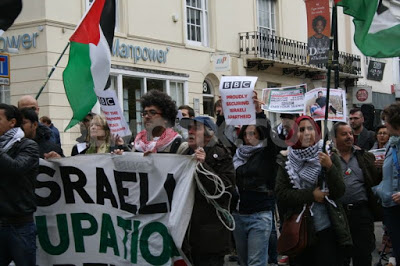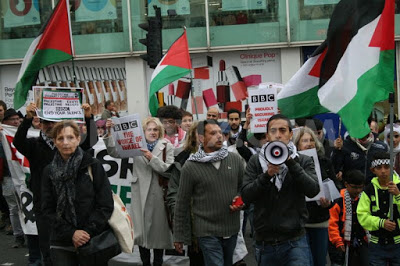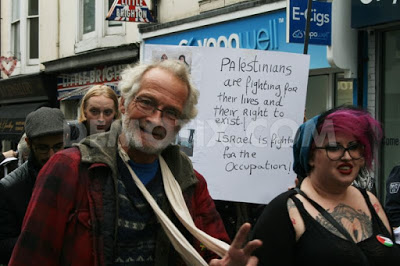Israel’s Unpaid Spokesman
 |
| Brighton PSC Demonstration outside BBC Radio Sussex |
Israel and the Occupied Territories, be it the genocidal bombing of Gaza or the
shooting on sight of Palestinians or just extra-judicial executions, you can
rely on the BBC to ensure that only the Israeli side of the conflict is told. No matter what the atrocities, whether it is
phosphorous bombs, attacks on journalists or even attacks on hospitals, the BBC
will ensure that only the version of the war criminals gets put over.
 |
| Israeli soldier attacks the press with pepper spray – one person is on the floor – not newsworthy for the BBC as no Israelis were hurt |
Palestinian ‘Terrorists’ . The BBC no longer even links to this story.
 |
| The most moral army in the world dealing with terrorist cameramen – doesn’t accord with the BBC narrative that violence is from the Palestinians only |
truly amazing dialogue between the overtly pro-Zionist presenter for the Today
programme, John Humphries, and Kevin Connolly, someone who passes for a BBC Middle
East correspondent. Below is the
dialogue between them and below that is my complaint to the BBC and my appeal
against the first stage decision. Rather than comment further I shall let you be the judge.
20.10.15. Today Programme 6.39 a.m.
– 21 minutes to 7 – Yet another attack on Israelis
last night. This time an Arab man with a
gun and a knife killed a soldier & wounded 10 people. The number is mounting, it’s about 50 now
isn’t it?
mention that 40 of them Palestinians – including executions
Connolly: We think about 50 in the past month. Sharp uptake of violence – Not just that
attack in Beer Sheba inside Israel itself.
On Saturday a wave of stabbing attacks in Hebron & Jerusalem. No
sign that this wave of rising tension & rising casualties is going to
abate. The Israeli government frankly is
casting about for a convincing answer because the nature of the acts of
violence still appears to be random and spontaneous. The decisions of individuals at a given
moment to stage an attack are not the work of organised extremist groups. For
that reason it’s been very tough to formulate a convincing security answer
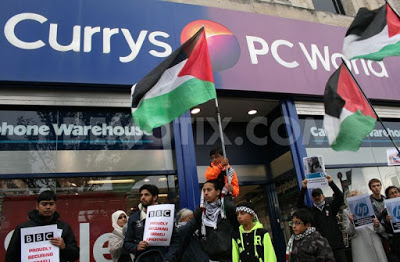 |
| Demonstration outside Currys which sells Hewlett Packard machines |
It is not Intifada is it?
Connolly: It’s a very difficult
question part of the problem is that media organisations begin asking that
question very early in these upsurges of violence. Whatever we call it, it’s an extraordinarily difficult
situation for the Israeli government to deal with because its own people look
to it for security. That very random and
spontaneous nature of the attack has left many Israeli citizens feeling that
any Palestinian passing them in the street might be carrying a knife, might be
planning to attack them and any passing car might at any moment be used as a
vehicle against Israeli civilian pedestrians. So although it’s not at all at
the level of critical mass of violence that you would need to use the word
Intifada, it doesn’t have the leadership perhaps that an Intifada might require
it has achieved an extraordinary change in the atmosphere of daily life here,
hence the political urgency for the Israeli government.
There is talk of more powers for the Police to stop
and search but that seems to be fairly inadequate in a way doesn’t it?
Connolly: I
think that is true. They are reviving a plan which existed a
few years ago to expand stop and search powers so the Police wouldn’t need
reasonable suspicion that a crime was being committed before they stopped and
searched somebody. I think that was actually originally formulated to deal with
a wave of night club stabbings. So they
have that on the books, they have erected a concrete screen between an Arab and
Jewish area of Jerusalem, not far from where I’m talking to you, that also has a
bit of an ad-hoc feeling to it and they also of course have armed
reinforcements in the West Bank. You have Police reinforcements here in
Jerusalem. So they are doing what they
can with visible security. But you can’t
get away from the fact that they are struggling with the nature of this upsurge
of violence. And that’s also a problem for the politicians. Because you will be having Benjamin Netanyahu
meeting John Kerry later this week. Probably
Kerry also meeting Mahmoud Abbas of the Palestinian Authority. So the big politics is beginning to kick in
here. But it’s hard to see where the
connecting wheels are between those big political meetings and the fact that
individuals are taking the decision to stage these attacks for reasons which we
are often left to guess at. Because the
attackers often die in the course of the attack.
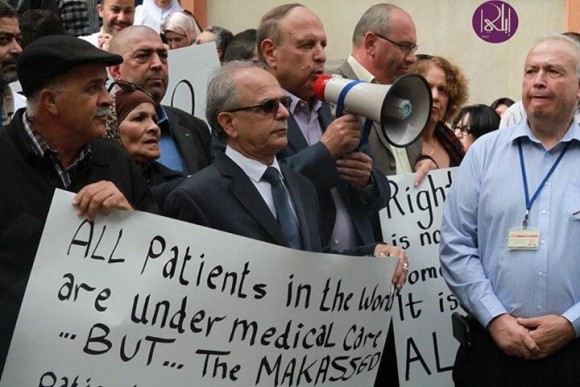 |
| Doctors and health workers protest at the attack on East Jerusalem’s Makassed Hospital – not newsworthy enough for the BBC |
thanks. It’s 17 minutes to 7. 19th
October 2015
for Complaint by Tony Greenstein 20.9.15.
violence in Israel. Mentions 50 dead but
not that 40 are Palestinians. No mention
mob violence against Palestinians or
murder of Fadi Alloun, chased by lynch mob, executed by Police. No
background to events eg firebombing of Dawabshe family in Duma. 3 dead.
No prosecutions – culprits known.
No mention that West Bank is Occupied.
No mention of ‘Death to Arabs’ marches in Jerusalem. And no mention of murder of Eritrean refugee
last night though other reporters picked it up.
All of these are documented by video footage Connolly doesn’t report.
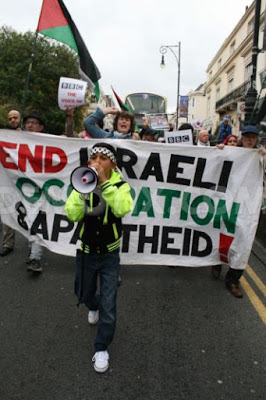 |
| Brighton Demonstration Against Apartheid Israel |
decision to stage these attacks for reasons which we are often left to guess
at.’ Let me see, what might be the reasons:
An occupation for 48 years.
abetted by Military.
but one where the law is in the hands of one party which deprives the other
party of basic human rights.
international law.
Police on the Al Aqsa mosque and the Temple Mount Institute and similar
messianic groups which openly call for the Mosque’s demolition, its replacement
by 3rd Temple. Groups r funded by
Israeli gov. Connolly mentioned Hebron,
where violent settlers repeatedly attack Palestinian civilians. No mention of death of Hadeek al-Hashlamon
last month killed by army.
Response 1:
response, which didn’t address any of the particulars of the complaint.
21 October 2015
Dear Mr Greenstein
Thank you for contacting us about the recent escalation in violence in
Israel, the West Bank and Gaza. We have received a wide range of
feedback about our coverage of this subject across our television and
radio programmes, and the BBC News website. In order
to use our TV licence fee resources efficiently, this response aims to answer the key concerns raised in complaints received by us, but we apologise in advance if it doesn’t address your specific points in the manner you would prefer.
We appreciate you believe our coverage of this story has shown bias in
favour of Israel and against the Palestinians. In this response we hope
to explain why we feel this has not been the case.
Across our news bulletins and programmes we have reported on the
increasing number of Palestinian deaths and casualties following the
actions of Israeli security forces. We have broadcast reports where our
reporters have spoken to the families of Israelis and
Palestinians killed in the recent violence and have heard their
respective stories and own specific takes on the conflict.
We have reported on criticism of Israel’s response to the attacks, which
has included the implementation of curfews in East Jerusalem and the
West Bank and the destruction of homes of Palestinians Israel claims are
connected to the attackers.
We have tried to explain how the current situation has come to pass from
the Israeli and Palestinian perspectives. This has included reporting
on the tensions around the holy sites in occupied East Jerusalem, the
building of settlements and on the daily realities
faced by Palestinians living under occupation. We have explored the
apathy held by many Palestinians toward the impasse in reaching a
lasting peace settlement, and on what many see as Israel’s unwillingness
to end the occupation which would see the creation
of an independent and sovereign Palestinian state.
BBC News tries to report on the
Israeli-Palestinian conflict in an accurate and duly impartial manner.
Sometimes this means we can’t always reflect the full extent of the
complexities of the conflict during one standalone report or bulletin.
We try to tell
the story of the conflict as experienced by both sides, across
programmes and bulletins and over time. We believe this has been the
case during our coverage of this recent spike in violence.
We have raised your concerns with senior editorial staff at BBC
News, who consider the range of feedback received from our audience
when deciding how they approach reporting on stories. Thanks again for
taking the time to contact us.
Kind Regards
BBC Complaints
I had pointed out that this was unsatisfactory I was sent a second, equally
unsatisfactory response.
Response 2:
31st October 2015
Dear Mr Greenstein
Reference CAS-3535889-VX0RCY
Thank you for contacting us regarding the BBC Radio 4 ‘Today’ programme on
19 October.
I’ve taken a look into this and note your original complaint to us along
with our response – we apologise for the initial misunderstanding.
We raised your complaint with Today, who responded as follows:
“We’re sorry you didn’t enjoy Kevin Connolly’s discussion with John Humphrys
on Monday morning.
Having listened back to it, we don’t agree with your interpretation of the
exchange. Kevin was reporting on the security situation inside Israel. The
attack at Beersheba bus station attack was the latest in a serious of attacks
by Palestinians in Israel. We talked about the attacks and the security
measures being taken to counter them by Israel security agencies. There was
also discussion of the random nature of this violence.
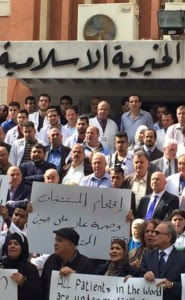 |
| Doctors and health workers protest at the attack on East Jerusalem’s Makassed Hospital – not newsworthy enough for the BBC |
John started by saying “Yet another attack on Israelis last night” but as
this was one of a number of similar attacks recently so I think that is fair.
The other exchange was;
JH : “The number is mounting now isn’t it Kevin. it’s about 50 now isn’t
it?”
KC “we think around 50 dead over the last month or so in this sudden, sharp,
uptick in violence”
At no point did either John or Kevin say that it was solely Israelis dead in
this period of violence.
Again, the report was about the internal security situation in Israel and
the political problems it was causing the Netanyahu government. In that context
it is legitimate to discuss how scared this latest violence is making Israeli
citizens.
Kevin states that the most of the motives are unknown, because in the
context of recent history, they are. This nature of these attacks, and the fact
the attackers often die in the attacks mean they cannot be investigated,
therefore the precise motivation is unknown. We think anyone listening to the
piece will understand that Kevin was talking about why this form of violence is
happening now. The wider causes and context of the Israel/Palestinian conflict
are frequently discussed across the BBC.
We know this subject inspires real passion on both sides but at the BBC we
remain committed to impartial reporting on all controversial issues.”
We hope you now find this satisfactory and thank you once again for taking
the time to contact us with your concerns.
All complaints are sent to the relevant news teams and to senior management,
I’ve included your points in this report. This is a daily report of audience
feedback that’s circulated to many BBC staff, including members of the BBC
Executive Board, and other senior managers. This helps inform their decisions
about current and future programmes.
Once again, thank you for contacting us.
Kind regards
I have now
made a second stage appeal (below) to the Editorial Complaints Unit. I won’t be holding my breath!
2nd November 2015
Reference CAS-3535889-VXORCY
To [email protected], [email protected]
Dear
ECU,
I
wish to appeal against the dismissal of the complaint which I submitted to you
on 20th October 2015 concerning John Humphries conversation with
Kevin Connolly on the upsurge in violence in Israel.
Despite
being assured by Alison Wilson, the Complaints Manager for the Editorial
Complaints Unit on 22nd
October 2015 that ‘BBC Complaints will establish whether there is anything
further to be added to the response that has been given, and advise the
complainant on the appropriate path for escalation.’ I was not advised on the
appropriate path for escalation.
Given your failure to follow your own procedure I will now submit this to
ECU and trust there will be no further attempt to delay considering an appeal. Given the cursory treatment to date, please
also advise of any further escalation that will be necessary if the complaint
is treated the same as at the first stage.
didn’t enjoy the repartee between John Humphries [JH] and Kevin Connolly
[KC]. It told me nothing and its bias
was self-evident.
My appeal in respect of your response is:
The unnamed person who responded from Today is either
hopelessly biased or is simply incapable of understanding the complaint. S/he says:
was reporting on the security situation inside Israel. The attack at Beersheba
bus station attack was the latest in a serious of attacks by Palestinians in
Israel.’
precisely sums up what my complaint is about.
What actually happened at the Beersheba bus station was not just an
attack by a lone Palestinian but also the lynching of an Eritrean refugee. KC failed to make even a cursory mention of
the fact that an Eritrean refugee, guilty of nothing other than being in the
despise category of refugee in Israel, (Israel doesn’t admit refugees as a
matter of policy, they are called ‘infiltrators) was murdered. Shot by a security guard and then kicked and
beaten until he died. Not one word of this lynching passed KC’s lips.
way of contrast the on-line version of Israel’s largest daily paper, Yediot
Aharanot, on 18th October, managed to include in its report both the
killing of an Israeli soldier and
the murder of a refugee. Perhaps you
could explain such an omission – bias or just ignorance? http://www.ynetnews.com/articles/0,7340,L-4712997,00.html
You say that ‘We talked about the attacks and the
security measures being taken to counter them by Israel security
agencies.’ That is indeed the
problem. It is just a security
situation, what is happening is simply a matter of individual criminality. There is no recognition that what is happening
is a reaction, on an individual level, to a harsh military occupation of the
West Bank and Jerusalem, to say nothing of the nakedly racist treatment of
Israel’s own Arab citizens. It’s just a
situation of law and order, so the BBC avoids all context. It is a continuation of your bias against
understanding.
The response to that part of my complaint relating to
the suggestion that those who were killed were treated as being solely Israelis
(i.e. Israeli Jews) is incomprehensible.
You simply deny what is plain and evident from the transcript. Like Humpty Dumpty words mean what you want
them to mean.
says: “Yet another attack on Israelis
last night” and you comment on this saying that ‘this was one of a number of
similar attacks recently so I think that is fair.’ You then say that ‘The other exchange was;
now isn’t it Kevin. it’s about 50 now isn’t it?”
over the last month or so in this sudden, sharp, uptick in violence”
assert that ‘At no point did either John or Kevin say that it was solely
Israelis dead in this period of violence.’
reference by JH and KC was solely to Israelis and yet most of the dead were
Palestinians. So even at the most basic
level it was wrong. There was no mention
of Palestinians other than as attackers.
Hence it would have been reasonable for viewers to conclude that the
only people who were dead were Israeli Jews.
course you could have mentioned the fact that there have been a number of
attacks on Palestinians by Israeli Jews and even attacks by Jews on Jews, who
were mistaken for Arabs. These are dressed
up as retaliations, for example the murder of Fadi Alloun. For example the online news magazine +972
carries the video of his shooting plus an accompanying article. New video shows accused stabber posed no
threat when shot http://972mag.com/new-video-shows-accused-stabber-posed-no-threat-when-shot/112593/
Jerusalem there are regular attacks by Jewish mobs on individual Palestinians
led by groups such as Lehava, which target Arabs in ‘Jewish’ areas. Their favourite chant is ‘death to the Arabs’
[Mavet La’aravim] But this phenomenon
has never been reported on by the BBC.
Fadi Alloun is believed to have been targeted by just such a group and executed by the
Police who only asked questions afterwards.
have been a number of other such shootings for example of an Arab woman in
Afula bus shelter who it was later admitted had not been trying to stab
anyone. Israeli Arab Woman Shot in Bus Station Not a Terrorist, Conclude
Security Services http://www.haaretz.com/israel-news/1.682928 Of course since the BBC never seems to manage
to report on such things they didn’t happen.
It’s a vicious circle which maintains the constant bias that you indulge
in.
You said that
states that the most of the motives are unknown, because in the context of
recent history, they are. This nature of these attacks, and the fact the
attackers often die in the attacks mean they cannot be investigated, therefore
the precise motivation is unknown. We think anyone listening to the piece will
understand that Kevin was talking about why this form of violence is happening
now. The wider causes and context of the Israel/Palestinian conflict are
frequently discussed across the BBC.’
is totally absurd. It is as if you have
compartmentalised the knife attacks and associated violence on the one hand and
the Occupation on the other, ne’er the twain do they meet. Are you really saying that it has never
occurred to your correspondent in Israel, KC, that there might, just might, be
a connection between the random violence of individual knife attacks and the
fact of the Occupation? Does he not
consider that the daily ritual humiliations of being harassed by the security
forces, stopped at check points, subject to random violence by unaccountable
border police, living in an uncertain situation where land confiscation takes
place all around you, where your residency rights in Jerusalem can be withdrawn
at a moments notice etc. etc. might just have some connection with the violence
that arose? If KC really does not
appreciate these things, perhaps you might consider transferring him to report on
the Chelsea Flower Show?
You talk about how ‘this subject inspires real passion
on both sides’. That is a convenient way
of dismissing a complaint but my concern is not passion but accuracy or the
lack of it and now dissembling by the Today team.
You also state that ‘we remain committed to impartial
reporting on all controversial issues’.
RT and Al Jazeera have reported tonight on the attacks on Palestinian
and Lebanese journalists by the Israeli para military Border Police. Nothing on BBC. No doubt if Israeli journalists were being
attacked in an Arab country, it would be headline news. Bias by omission is another facet of your
coverage. Your commitment to reporting
on all controversial issues is therefore just a pious statement of intent
rather than an established practice.
complaint as satisfactory.
Yours faithfully,
Tony Greenstein
I also made a complaint today against
the fact that Danny Cohen, one of the most senior BBC Executives, had signed a
letter in the Guardian last week which opposed the Cultural Boycott of Israel. Couple this with the complaint of former BBC Chairman
Lord Grade Ex-BBC chairman Lord Grade attacks corporation over Israel coverage that the BBC is too sympathetic (!) to
the Palestinians and one gets a measure of the institutional and systematic
bias in favour of Zionism and the Israeli State that exists in the BBC.
Against Danny Cohen, BBC Director of Television
Fairhead,
Trust,
Broadcasting House,
Place, London, W1A 1AA
04 November 2015
Ms Fairhead,
Thursday 22nd October a letter headed Israel needs cultural bridges, not boycotts
appeared in the Guardian. One of the
signatories to this letter was a certain Danny Cohen, the BBC’s Director of
Television. Mr Cohen was one of 150
people calling for Israel to be protected from cultural boycotts.
Cohen joined senior figures from the Conservative Friends of Israel, 13 of
whose officers and members signed it, and one from the Labour Friends of Israel. Unsurprisingly, there were no pro-Palestinian
MPs among the signatories.
letter claimed that “Cultural boycotts singling out Israel are divisive and
discriminatory” and goes on to call for “cultural engagement” in place of
boycotts. Perhaps if the BBC were to
fairly cover Israel’s behaviour in the Occupied Territories, East Jerusalem or
indeed inside Israel itself, you would soon be aware of what discrimination
really means.
BBC has consistently failed to cover the attacks of the Israeli military on
journalists or even the recent attack, with tear gas, sound bombs and rubber
bullets on the Makassed hospital in East Jerusalem, which other news outlets
(RT, Al Jazeera) manage to cover. Its
news agenda is that of Israel’s Information Ministry and Press Office. If you were at all concerned about
discrimination then how can one account for your consistent failure to cover
the persistently high levels of racism in every aspect of Israel as a Jewish
state, as measured by opinion polls. For
example the fact that 75% of Israeli Jews oppose the idea of living next to an
Arab. http://www.ynetnews.com/articles/0,7340,L-3381978,00.html
is of course nothing new in this.
Throughout the period of the cultural Boycott against South Africa, the
BBC consistently supported Margaret Thatcher’s policy of ‘constructive
engagement’. We expect nothing better
from the BBC, which was born in the womb of the state. Nonetheless you have a formal legal
obligation to be neutral and it is that which you are in persistent breach of.
Cohen is a member of the BBC’s executive board and one of the most senior
figures in the organisation. His role within the BBC demands neutrality and yet
he has publicly made known his support for Israel and its Apartheid policies
and practices.
The Royal Charter, which governs the BBC, demands that the organisation must be
impartial in its reporting. This must
also be a key requirement of its staff. The fact that Danny Cohen has signed
this letter, in the company of openly pro-Israel figures, without subsequent
censure from the BBC, demonstrates that this is not the case.”
has so far faced no public censure from the BBC Trust for his behaviour. I am therefore writing to you to ask whether
or not you intend to take any action against him.
is not just another employee of the BBC.
He has huge influence within the organisation, overseeing the BBC’s four
main channels, in addition to BBC iPlayer, and online content for BBC
Television. He also oversees the Drama, Entertainment, Knowledge and Comedy genres
and BBC Films. Further responsibilities include the BBC Television archive and
BBC Productions, Europe’s largest television production group.
Yours sincerely,
Greenstein


